Can I Drink Tap Water in India?
The short answer to this question is, “no”.
The water supply in India can often be full of all kinds of pollution such as arsenic, it’s typically extremely unsafe, and because water is the best carrier of disease it’s an easy way to get sick.
In fact, one time a family member of mine got a terrible flesh-eating parasite from drinking unsafe, dirty tap water in India.
These India travel tips are not to be taken lightly and caution is highly recommended. I don’t want to scare you from going, but bad water is the #1 cause of dysentery and parasite infection in India and around the world.
Follow these tips below and you should stay healthy.

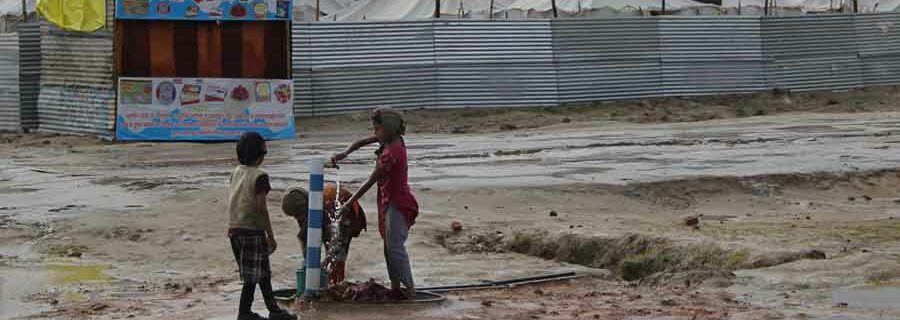


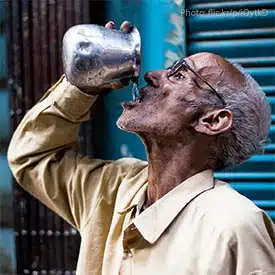
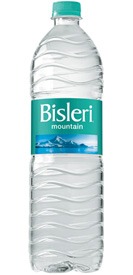 The best bottled mineral water brands in India I recommend are: Bisleri, Kinley and Aquafina (in that order) and you can get them practically everywhere in India in many different sized bottles.
The best bottled mineral water brands in India I recommend are: Bisleri, Kinley and Aquafina (in that order) and you can get them practically everywhere in India in many different sized bottles.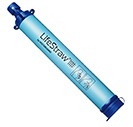
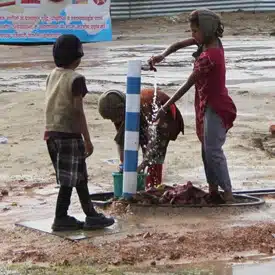 Only having pure drinking water in India is one of the most important things you can do for your health while there. Although, it’s not the complete picture. As foreigners our immunity is usually not used to the climate and different types of bacteria found in India. Knowing what to eat, what not to eat, how to deal with pollution,
Only having pure drinking water in India is one of the most important things you can do for your health while there. Although, it’s not the complete picture. As foreigners our immunity is usually not used to the climate and different types of bacteria found in India. Knowing what to eat, what not to eat, how to deal with pollution, 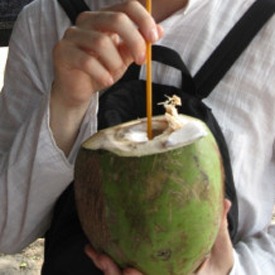 Fresh coconuts are my favorite for sure. They are extremely good at hydrating you, giving you electrolytes and making your upset stomach, happy. Note: If you want to be super careful, don’t drink coconuts unless you’re satisfied with the cleanliness of both the straw and knife that the coconut vendor is using. You can even bring your own
Fresh coconuts are my favorite for sure. They are extremely good at hydrating you, giving you electrolytes and making your upset stomach, happy. Note: If you want to be super careful, don’t drink coconuts unless you’re satisfied with the cleanliness of both the straw and knife that the coconut vendor is using. You can even bring your own 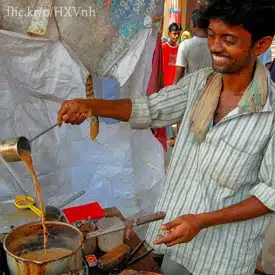 Chai has a lot of milk and sugar along with Ayurvedic spices such as cardamom and ginger. There are chai stands at almost every corner and it should be safe to drink as long as you see them boiling it properly and you’re certain the cup is clean. These days they often use a new plastic disposable cup which is good for hygiene but bad for the disgusting trash piles that build up. Other stands have glass cups which are almost always dirty because they are reused very quickly and not washed properly so watch out! The chai shouldn’t cost more than 5 or 10 rupees.
Chai has a lot of milk and sugar along with Ayurvedic spices such as cardamom and ginger. There are chai stands at almost every corner and it should be safe to drink as long as you see them boiling it properly and you’re certain the cup is clean. These days they often use a new plastic disposable cup which is good for hygiene but bad for the disgusting trash piles that build up. Other stands have glass cups which are almost always dirty because they are reused very quickly and not washed properly so watch out! The chai shouldn’t cost more than 5 or 10 rupees.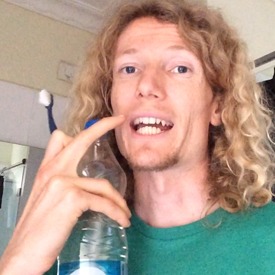 As annoying as it may seem I advise you to only brush your teeth with bottled water (that’s me on the right).
As annoying as it may seem I advise you to only brush your teeth with bottled water (that’s me on the right).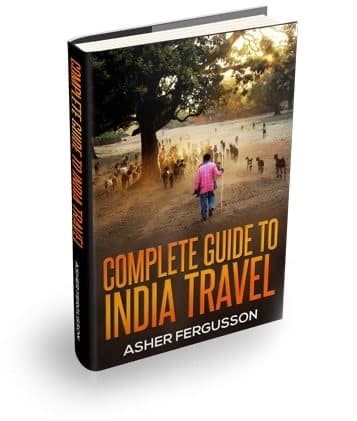
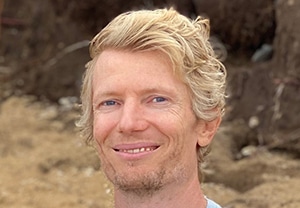
this is too over . if tapwater looks good then you can brush your teeth. see the water first if it looks pure then you can wash with it . also in some areas we get pure river water (ganga yamuna godavari krisna water).
no problem .
No, this is not too over the top at all. On our trip, two of us got very sick from “re-bottled” water and another of us got an infection through brushing teeth. Bacteria in the water got in through bloody gums – which commonly happens when brushing teeth. Not over the top, not in the least.
I agree Susan. As a westerner we can never be too careful when drinking water in India. I check my bottled water really carefully and have since never had a problem.
Finally! Someone putting out there what the water in India can really do to you! Even after every precaution is taken, you still can get sick as I have on every single trip to India. And it’s not pleasant. On one trip, I was going blind with everything white, on another I couldn’t cough without shooting something out of my throat or butt.
A couple of things I want to add on the topics in this article.
Bottled water–examine your bottles carefully, and if you’re on a long trip, get a large 1 gallon bottle and fill your own bottle and take it with you–this way there’s no question about the safety of your water (watch Slumdog Millionaire to see how the glued cap is commonly done in the restaurants). Be sure to clean the outside of the water bottle with a ‘wet one‘ pre-moistened wipe (They are a GODSEND in India–get at least 50 for a week trip). If there is even one microscopic spec of India dirt and disease on the part of the bottle your lips touch, you WILL get infected with something. Western immune systems aren’t used to the unhygenic stuff even in the air there, so be extra clean about everything.
Other beverages–these are good if they are carbonated drinks from either coke or pepsi–READ THE BOTTLE. And then remember that dirt on the outside of the bottle can harm you if it gets inside your system. Don’t use the straw they give you, don’t drink with your lips on the bottle. Either master the art of drinking without touching the bottle (you’ll see people doing this all the time in India), and/or bring your own bottle or container to transfer the soda into. This isn’t a bad idea either since a nice western thermos can keep the cool drink cool in the India heat.
Chai–great drink, but it’s too risky in my opinion to risk drinking this anywhere on the street. The chai vendors are typically using tap water and not boiling it long enough will not kill those germs. If the cup is anything but disposable, forget it–the cups are rinsed in plain tap water and not dried afterwards so any germs in the droplets will get in your chai.
Electrolytes from the west. This is definitely important. You’ll never miss gatorade until you need it and don’t have it. I found that a small resealable container of the powdered electrolytes is great for longer trips. But why stop at Gatorade? Bring western anti-bacterial medicine too. Just let your doctor know where you are going. Sure, you can walk up to any ‘pharmacy’ in India and get anything you need (there’s no need for a prescription for ANYTHING), but you never know what you’re getting, and you don’t know if it’s up to western specs.
Brushing teeth with bottled water is an absolute MUST. In fact, be sure to follow up with a powerful mouthwash like Listerine afterwards to help kill anything that may have gotten in your mouth inadvertently. Sometimes, you can just use Orbit gum and mouthwash instead of brushing. Speaking of which–showering and bathing is another area where you can’t let water come in contact with mucus membranes such as in your mouth, eyes, or other parts. Don’t let the water in your mouth, try to keep it out of your eyes, and don’t ‘deep clean’ anything. Better to just stay dirty until you get to a ‘safe’ shower in the west. Yes, you will feel icky, but not as icky as you would when sick. You can always enjoy a nice shower and good teeth brushing once you get home. I always do.
So one of the best ways to prepare for India is to imagine you’re going camping. You will need to be wary of any water, be ready to have no bathrooms, bring your own tp (camping rolls are great to pack and keep on you during the day), have some STRONG bug repellent (100% deet is my favorite), have hand sanitizer at all times as well as a wet one (we would wipe down utensils at restaurants, use them as napkins, and more), have a secure way to keep your ID and money like a “passport pouch” (pickpockets and thieves are everywhere–just look at the corrupt systems in government from the police to the very top), and more that I can’t think of at the moment.
Once you ‘get native’ you can find some really great and genuine people in the country. But be ready to be a large western tourist target for every scam imaginable the first few trips. Welcome to the third world! Enjoy your visit!
Hi Samir,
Thanks for your detailed info! Sounds like you’ve had some intense experiences! I agree with your points – you can basically never be too careful. At the same time I think it is good to not be paranoid but just know how these things in order to stay safe and then enjoy the ride.
Cheers,
Asher.
LOL half of my family is in the pharmaceutical industry and a good amount of “western medicine” comes from India. I got really sick in India and threw up four times in 1.5 hours so I stopped at a pharmacy where a child about 15 years old gave me a drink with electrolytes when I described my symptoms and I felt much better only 2o minutes after taking it.
Hi Neha,
I think Samir’s point is that generally “Western medicine’s” if bought in the West have higher quality control standards than many of the products sold in India.
Glad the electrolyte drink helped – it’s amazing how well it works!!
Cheers,
Asher.
Hi Asher,
You are doing a great service here. I’m Indian and I believe it shouldn’t hurt anyone to admit that water is polluted all across India. Even bottled water is being churned out of home-run cottage industries filling in tap water and sealing the bottles for sale in the market. And the govt has no clue and the industry is regulated only on paper – if at all it does.
Ajay
Thanks, Ajay – I appreciate your perspective.
Cheers,
Asher.
I travelled India for three months with my 8 year old son and we never had a problem with drinking street chai – and we drank a lot of it.
I think it would be a shame for people to be too paranoid to drink street chai, because its just such a tasty and heart warming drink… its an experience in itself. It made us feel at home and provided a nice break at tea stalls on long journeys.
We also drank bottled water (I never paid attention to the brand) and when we were in remote areas we drank and cooked with river water that we either boiled or gave a once over with a steripen. I only recall having a bit of the runs for a few days in our whole trip. No vomits, no stomach aches… maybe we were just lucky. ?
Hi Kelly,
I’ve also never had a problem drinking chai and agree it’s an amazing experience to drink it with the locals 🙂 At the same time I am careful because of the factors I mention in the article where the water needs to be boiled properly and the glasses need to be clean.
Drinking river water sounds pretty dodgy unless you were high in the himalayas? Even if you don’t get sick from it because of boiling and using the steripen I’d question the purity of the water.
Cheers,
Asher.
I’m assuming this is a joke. If not, it’s quite sad (and telling that the author of this blog seemed to take it seriously).
The authors is sold to mnc …bottel water is causing cancers..so go for uv or ro treated water..
Hi Vijas,
I am not sold to “mnc” – don’t what that even is? In my experience, good quality bottled water is essential for Western tourists because it’s easy to get and the only water that is safe for us to drink. If I was based in one location for months then I would get a great UV, RO water filter.
Best wishes,
Asher.
It is definitely not advisable to drink tap water in India as there are many unsafe sources. Regarding bottled water, a recent study by the BARC team on Mumbai’s bottled water resulted in high toxin content. With India’s increasing water crisis, there are limited choices in terms of drinking water. For tips on how we can overcome this problem and resort to a safer source of drinking water visit, www.waterconsumer.org
Thanks for the info Priyanka! The easiest thing for a tourist is to just buy bottled water from only the best brands like Bisleri, Kinley and Aquafina.
Hi, can I know how bad is the water in India? Is it really unfit for bathing? My friend suggested bathing with bottled water, is it really necessary? And how much generally will it cost to buy one huge tub of bottled water? Thank you!!
Hi Susan,
You can definitely shower in India without a problem. Just don’t open your mouth or brush your teeth in the shower. I would avoid taking a bath tub and some of the rivers like the Ganges that runs through Varanasi may be unsafe to bathe in.
Bottled water costs around 20 rupees/ liter.
Cheers,
Asher.
High toxin levels found in Mumbai’s bottled water
High levels of certain carcinogens were found in bottled drinking water samples in Mumbai, according to a study conducted by the Bhabha Atomic Research Centre (BARC) at Trombay.
A BARC team of four scientists checked 90 samples from 18 brands of bottled water sold by various manufacturers in the city. They found 27% samples contained higher than World Health Organisation-permitted limits of bromates, a salt containing bromide that is a by-product of the disinfection. The International Agency for Research on Cancer (IARC) classifies bromates as Group 2B carcinogens that could possibly cause cancer in humans. Some samples had bromate levels four times the WHO limit of 10 microgram per litre.
The BARC findings were published in the January 10 issue of Current Science Journal, a peer-reviewed Indian science journal. Its objective was to check the water for chemical by-products caused by disinfecting processes.
Using ozone, for instance, can form bromates if the water had bromine to begin with. Similarly, certain hypochloride salts can lead to the formation of chlorites and chlorates that are known to affect red blood cells of mice. “Bottled water is in many cases drawn from ground water, which, in our country, is known to contain heavy metals that can cause chronic diseases like dementia, heart problems as well as hypertension,” said Dr Altaf Patel from Jaslok Hospital, who conducted several studies on heavy metal poisoning.
The bottled water industry, which has faced allegations of the presence of toxins, isn’t convinced. Ramesh Chauhan, chairman of Bisleri International, said, “Is the problem with packing or water? If it’s the latter, then it’s the city water that is bad. There have been no objections with bottles.” He said the city’s piped drinking water contains chlorine which is harmful. “We don’t allow chlorine in our process, but we do use ozone for disinfection,” he added.
Technically speaking, the BARC findings don’t mean bottled water samples are contaminated or below standards, because India doesn’t have any standards on bromate levels. The study, in fact, says the paper should be used to recommend standards for disinfection by-products. “Of the samples analyzed for bromates, 38 did not contain any detectable residues and the rest had detectable levels ranging from 0.7 to 43 microgram per litre. There are no regulatory limits prescribed in India for drinking water. Therefore, the presence of bromate in a sample does not violate any Indian standard for drinking water,” said a BARC spokesperson.
Source: http://timesofindia.indiatimes.com/city/mumbai/High-toxin-levels-found-in-Mumbais-bottled-water/articleshow/46036756.cms
Hi Raju,
Thanks for the info! I believe the brands: Bisleri, Kinley and Aquafina are the only bottled water in India to trust. And they’re the safest type of water us Westerners can easily drink while traveling in India. I have never had trouble with these brands but it would be great to see the results for tests on their water specifically.
Cheers,
Asher.
Hello guys what a nice blog that gives nice information about safe and pure water.I am agree with your sugession that how we can drink pure water while going on trip to protect from germs, bacteria and viruses.Thanks keep it up.
Thanks Neha!
I’m so glad to be able to help 🙂
Cheers,
Asher.
Informative article, but I do wonder what makes you think that chai was ‘introduced’ by the British. It certainly wasn’t. We have been drinking tea for thousands of years and they literally *colonised* India for tea, amongst many other things.
The words ‘chai’ and ‘tea’ are both of Indian and Chinese origin, respectively, and the very concept of drinking tea originated from India and China. Tea is not native to European culture at all, and I would appreciate it if Westerners stopped contributing to the erosion of our identities by claiming that the very basic things that define us were introduced to us. Try the other way round.
Kindest regards,
RR
Hi RR,
Sorry for the wrong wording. It should be “influenced” by the British. I have corrected it now. See here from Wikipedia:
Tea plants have grown wild in the Assam region since antiquity, but historically Indians viewed tea as a herbal medicine rather than as a recreational beverage.[5] Some of the chai masala spice mixtures, or Karha,[6] that are still in current use are derived from Ayurvedic medical texts.
In the 1830s, the British East India Company became concerned about the Chinese monopoly on tea, which constituted most of its trade and supported the enormous consumption of tea in Great Britain: approximately one pound (by weight) per person per year. British colonists had recently noticed the existence of the Assamese tea plants, and began to cultivate tea plantations locally. In 1870, over 90% of the tea consumed in Great Britain was still of Chinese origin, but by 1900 this had dropped to 10%, largely replaced by tea grown in British India (50%) and British Ceylon (33%).
However, consumption of black tea within India remained low until the promotional campaign by the (British-owned) Indian Tea Association in the early 20th century, which encouraged factories, mines, and textile mills to provide tea breaks for their workers. It also supported many independent chai wallahs throughout the growing railway system.
The official promotion of tea was as served in the English mode, with small added amounts of milk and sugar. The Indian Tea Association initially disapproved of independent vendors’ tendency to add spices and greatly increase the proportions of milk and sugar, thus reducing their usage (and thus purchase) of tea leaves per liquid volume. However, masala chai in its present form has now firmly established itself as a popular beverage.
Source: http://en.wikipedia.org/wiki/Masala_chai#History
forgive me for asking this question. If you guys find my country so dirty and like a germ land mine why do you guys want to come here. to feel good about yourself. or some eat pray love shit where you think you are learning about new culture while passive aggressively insulting everyone and everything around. I think you would need a shrink or a marriage counselling to help through mid life crisis instead and will be germ free and no body needs to shower with their mouths closed kapish
Hi there,
India is one of my favorite places on earth – I absolutely love it! It is so beautiful, has incredible history and amazing spiritual power. That’s why I visit every year.
I wrote this blog to help Westerners avoid getting sick (dysentery etc) because it is so easy for that to happen if we’re not careful. Many of my friends who excitedly went to India got very sick and one friend even died from an E. Coli infection after eating street food.
These tips are in no way trying to offend, insult or to make me “feel good about myself” but simply to give the precautions we Westerners need to take to enjoy our journey to India.
All the best,
Asher.
hmm you are right and logical which is quite rare ,since this is the internet. I am sorry for the outburst . I cant stand one of the emails by samir which mentions india as a third world . Does he even know the concept of third world? anyways my anger should not be towards westerners but towards the NRIs ( not really indians) who think they know india,cause they read a couple of books and heard a few bollywood songs. what they call a vacation and a spiritual awakening we call it HOME. . I am sorry if I spoke out of terms good day
No problem mate. I understand your point of view.
Cheers,
Asher.
I went with Gate1 four years ago. It’s NOT just the Water in the Third World. Fruit and vegetables are fertilized with human “night soil” over there! LOTS of Germs and Parasites! Even in the Good Hotels with the tempted cut fruit on the buffets, if you eat it, you may get into Trouble (Ask me how I Know this)
Also, they have the disgusting “hole in the ground” toilets in some places which is REALLY bad and embarrassing if you are already sick with diarrhea.
The embarrassing thing is not the “hole in the ground” toilets and before commenting on hygiene, we wash our selves with water but you just wipe them with paper after using toilets. This is most embarrassing and unhygienic.
I don’t see how wiping yourself with paper is unhygienic, especially when compared to using untreated water that is full of microbes? 🙂
Because the paper is still not going to get all your poop out! I see people in the ‘West’ now adopting ‘health faucets’ or bidets as more hygienic practices, which are commonplace in Urban India and majority of Urban Asia, a derivative of our washing practice. Washing is by far, a more hygienic practice than wiping with paper. If wiping was enough, why wash dishes? Or ourselves? Or anything ever?
The world cuts roughly 27000 trees a day so that privileged few can wipe their asses with paper that is processed from it. If some sections of the planet stopped thinking they were entitled enough to do that, and just washed their bums with the water that is used to make that toilet paper any way, our planet would be a better place.
As someone who HAS caught both typhoid and cholera and India because of drinking water, I can understand why people should be more careful and concerned when their immune systems are not attuned to the microorganisms present in the country. But I do think that all this paranoia severely reduces your ability to enjoy yourself in a country that has far too much to offer, and I’ve learned that the best way to actually be able to be safe AND have fun is building our own personal tolerance the natural way. In over 15 years of traveling across the world, a LOT of it within India and other developing countries in Asia, even coming across and living with other foreigners on multiple occasions, I have never seen anyone who brushed their teeth with bottled water when a tap was available. Maybe it’s just because I travel in a different class of people – those who’d think the idea is ridiculous and wouldn’t have the money to afford it anyway. And do you think all the food you eat in the country is cooked with distilled water, your plates and cutlery washed and sterilized according to industrial standards? Your hotel laundry fresh from the store? Disillusionment and a fallacy of safety is what most of this paranoia establishes.
Most of all, I find it absolutely hilarious that foreigners/outsiders can actually think that not taking a shower is a more hygienic alternative compared to taking one. This type of ‘logic’ would never prevail in my country, and I feel happy about that. Anyone who can think that they are special enough that a country cannot offer them facilities to clean themselves can just keep their dirtiness out of our country honestly 🙂
Hi A,
You make some great points. I agree it is sad to cut down so many trees for toilet paper and I agree it may be hygienic to use water. My tips are for first time India travelers who are not going to learn how to use the water to wash themselves in a 2 week trip.
Although you also contradict yourself. You admit that you got two horrible diseases from drinking tap water in India yet you think it’s okay to “build tolerance naturally”. Also, you can’t necessarily build “tolerance” to flesh eating parasites like the one that got my aunt and nearly killed her…
Anyway, I am all about taking logical precautions to avoid serious illness and to enjoy my trip to India and this doesn’t have to include being paranoid.
Cheers,
Asher.
Are you suggesting that the microbes go up your ass when washing? This is the first I hear of that. And how about toilet paper, the microbes don’t stick there?
I was in India recently… did all the right things, only bottled water, only boiled & hot food, only eating at good restaurants.. but still managed to get sick.
You know what, you cannot control all the types of microbes and viruses… using sanitizer might kill microbes but their enemies, the viruses get a free run.
All you can do it learn to squat, don’t drop contents of your pockets and always look for the nearest bathroom.
This worked for me.
In no country on this planet are people so friendly when you explain to them what you are going thru…. and this hospitality beats any of the issues with microbes/contaminants.
If you need to brush and take a shower with bottled water and cannot even eat any of those amazing tropical fruits, you simply should not travel to India or Southeast Asia. Stay home and spend your money at home.
Hi Flint,
I hear you but taking precautions is never a bad thing, right?
I haven’t been sick once in my past 4 visits to India and I put that down to taking basic precautions.
Cheers,
Asher.
Good to know that western people like to visit India and trying to know about it’s history and feeling the spiritual bliss.
But if you people are so very afraid of drinking water, eating food, bathing, brushing and even using our bathrooms here, I wonder what is the need to visit us? You can sit in your own comfortable “hygienic” place and can use your technology to get all the information you need. This way you may not risk your life.
Even if you have to come to visit why bring just “western medicines” and stuff? Carry your self with your own so called hygienic water and your own food from the west. Why do you even trust Bisleri or Kinley? Because it’s Coca-Cola’s?
Don’t just blame India, its you people who can’t come out of your comfort zone. To let you know why we are immune is “We live on nature but you live on medicines”.
Hi KCK,
As I’ve explained many times before. Us Westerner’s have different immune systems than people who grew up in India. Since our bodies are not used to many of the microbes that present in the Indian water and food etc we are highly susceptible to getting sick. My tips are purely to help prevent other Westerners from getting sick. They are in no way meant to offend.
Interestingly, I have heard from my Indian friends that when they visited Western countries they also got very sick because they weren’t used the microbes, climate and food in the West. So the same precautions should be taken by Indian’s traveling to the West…
All the best,
Asher.
Thanks for sharing informative article. Water safety has become a major issue these days. And this is really debatable topic to discuss about that is it safe to drink tap water. According to me as an Indian, tap water is not at all safe to drink Because due to increase in water pollution, water of Tap contains so many harmful germs which may cause so many health diseases.
So we should only drink safe and clean water.
Thanks for offering your logical perspective Neha. 🙂
Cheers,
Asher.
Thanks for sharing informative article. Share more facts about this topic. I would like to read more about it.
Good advice on avoiding ‘fake’ bottled water (it’s not just unscrupulous shopkeepers; I’ve found it presented as a complimentary beverage in an Indian hotel before now, and the unwary can also be tricked by semi-professional larger scale re-use of branded bottles).
With regard to your advice on what to do if bottled water isn’t available, note that Giardia isn’t a bacteria, it’s a cyst-forming pathogenic protozoa. Iodine only has “low to moderate effectiveness in killing Giardia” (and was banned from use as a drinking water disinfectant in the EU in 2009).
UV disinfection is problematic where the turbidity of the water is greater than a single digit NTU measurement, and claims of destroying “99.9% of harmful microorganisms in water” are simply disingenuous. The US EPA standard (widely adopted worldwide) for minimum microbiological removal/deactivation by personal water purifiers is 99.9999% for bacteria, 99.99% for viruses and 99.9% for protozoa.
According to its handbook, your Katadyn filter only protects against bacteria and protozoa, and not viruses, so be careful about putting yourself at risk from such as waterborne Hep A which is highly endemic in India.
For boiling water disinfection its recommended that you achieve a rolling boil i.e, continuously, for at least 1 min. (and if you’re going back to the Himalayas it’s 3 mins for anywhere over 2000 m/6562 ft).
Apart from the microbiological contaminants in water, you mentioned arsenic. In choosing your drinking water purification system for India don’t forget to look for something that will deal with heavy metals, pesticides and volatile organic compounds.
With an upcoming trip to India, the water issue is a big concern of mine. Thanks to information like this, I think I have found a great solution. The Grayl is water purifier about the size of an insulated water bottle you’d get from Costco. It operates like a French press, which makes it useful for purifying water in batches for things like brushing your teeth (no straws, sucking, or cross-contamination). Here are the specs:
-Removes 99.9999% of viruses (e.g. Hepatitis A, SARS, Rotavirus); 99.999% of protozoan cysts (e.g. Giardia); and 99.9999% of disease-causing bacteria (e.g. E. coli, Salmonella)
-Filters many chemicals (e.g. chlorine, iodine) and heavy metals (e.g. lead, arsenic) that affect health, flavor and odor
Not sure what is real and perceived. Read tazaagua is offering their tea and coffee water to luxury hotels in Mexico- and possibly India in the future. i enjoy my morning coffee prior to starting my day so this is cool.
Don’t even THINK about drinking tap water. I thought I was being safe, HA! I’m still battling giardia, a parasite, six weeks after my return to the states. It’s not fun or easy to get rid of.
As an Indian and a Kiwi and having lived all over the world, I think this advice is a bit crazy. First of all, no one in India generally drinks tap water either. Most houses and restaurants have filters installed for water so if you drink from these, you are just fine. As to your statement of the best bottled water made by Pepsi and Coke- I think you are far from the truth. Those are some of the most corrupt companies in the world and there is plenty of evidence to show that their name doesn’t mean quality- it only means cheap products. And beyond that, they are extremely bad for local aquifers as they harvest water unsustainably and those who suffer are the poorest of the population. There is plenty of research to show the high levels of heavy metals and carcinogens in water from these very companies.
As to brushing your teeth with tap water, nothing will happen to you. I have plenty of family and friends that grew up entirely in the west and brush with tap water, and nothing happens.
And as to electrolytes and pharmaceuticals in India being of lower quality- thats just what big Pharma in the US would like you to believe. Knowing people who own pharmaceutical companies that operate across continents, I know for a fact that Indian medicinal products are of the highest quality and thankfully they are produced at a price that people can afford it.
Being an expat Indian who has lived abroad for over 10 years, I think it isn’t helpful to cause so much fear about going somewhere- why not let a local give some sensible advice on how to be safe in India. For instance, if you are a local, you would know that it is far safer to eat in a tiny restaurant than in a big fancy one in a Hilton or something similar, as the food is cooked fresh as compared to the refrigerated and preserved food in bigger restaurants.
I usually don’t respond to posts such as these but I thought this was a bit extreme.
Hi Meg,
You make some good points.
But my perspective still stands and is valid in my humble opinion:
1) Are you kidding? Many Indians can’t afford a filter and even with a filter, it’s not certain it will be up to date with new cartridges etc.
2) I know there are issues even with bottled water but in my experience, Bisleri, Kinley and Aquafina are the safest options.
3) Brushing your teeth with Indian tap water is not safe, period. It is fine for someone who grew up in India such as yourself but for the first time India visitor it will more likely lead to illness.
4) I am yet to find an electrolyte in India that didn’t taste horrible, sorry.
5) Local knowledge is good but a local Indian doesn’t understand how delicate the Western stomach is and therefore wouldn’t think any of these points are a big deal. So I think getting a Western perspective is helpful for Western visitors.
As I mentioned above:
I wrote this blog to help Westerners avoid getting sick (dysentery etc) because it is so easy for that to happen if we’re not careful. Many of my friends who excitedly went to India got very sick and one friend even died from an E. Coli infection after eating street food.
These tips are in no way trying to offend, insult or to make me “feel good about myself” but simply to give the precautions we Westerners need to take to enjoy our journey to India.
All the best,
Asher.
Yes, Agree to tap water in India is not safe for drinking. I always recommend everyone to use a water purification system.
Thanks for this blog, I have to travel to Pune for 3 weeks and am very worried about the constant precautions I need to take. I would prefer not going at all but my company is forcing me. Is it safe to drink tea or coffee from local restaurants? What about the local chains, I see there is a Domino’s Pizza near my office. Are these American chains safer than eating food from street vendors?
Hello Lita,
About Pune I can say that it has many visitors from Western countries. Precaution is always better but over cautiousness / negative thought will keep you in tension, you may get sick due to it 🙂
Pune is IT & automotive manufacturing hub so as I said more visitors are from western, so do not worry about food, you will get all types of western food here apart from Pizza.
You will get everything you like from 5 star hotels to small restaurants, shopping malls to street shopping. In india many people say pune is city of hotels & restaurant as a joke because on every street there is restaurant & with rush all time.
I’ll not say to try street foods but surely many restaurants are there for you to taste quality food of Indian spices ( do not try too spicey if you are not use to with it)
Just carry water bottle, rest you will enjoy your stay here.
Pune is famous for it’s own culture & it has many historic places. It’s a combination of traditional & modern culture.
I am working with some German companies & seen many regular / frequent visitors who didn’t get sick & enjoyed stay here.
All I can say it’s not about hygiene ( I am not saying do not take care about yourself) it’s more about adapting to atmosphere, because here I can say even in India some if we travel 50 + Km taste of water changes some Indians can digest it some can’t.
you can see some new culture & people apart from your routine life, I can say just experience it with taking little care of your health.
Yes that all I can say because I am from Pune. 🙂
Wow you are from Pune! How lucky I am, thanks very much for details 🙂
I’m curious about the author’s view regarding that morality of encouraging Western tourists to India to *only* drink bottled water. Are you keeping all the empty bottles in your suitcase to recycle once you return to your home country? Or more likely, throwing them all away while you’re in India, adding to the piles of trash you see there.
All that seems to matter to you is your own personal health and well-being, not the pollution you are creating in a country that is not your own. If you’re really so scared and paranoid about the local water doing you harm, why not stay in your pure Western homeland.
Hi there,
I agree that adding to the trash piles in India is definitely not a good thing. But since water is the best carrier of disease I don’t know another solution for a tourist who is typically visiting for under 2 weeks. I suppose you could bring some kind of high quality travel filter but I’m not sure how well that would work and then you’d probably spend half your time in your hotel room filtering the water.
What is your solution to the problem apart from avoiding visiting Incredible India altogether?
All the best,
Asher.
I agree with your post. Taking precautions is necessary when you are travelling to different country. And you are not creating that much pollution when you are here for few days on vacation. You need not worry about that. Health comes first.
Our bodies are accustomed to the environment we grow in. In a foreign land, we may get sick consuming the food/water of that place only because our body has no antibodies for the native germs. There is nothing wrong in taking precautions.
I feel scratchy throat when I travel for the first time to a different state, within India. Its natural.
Some people are defensive like that. Pay no attention to them. Enjoy your trip.
And I confess, India can be relatively more germ-y and unclean-y, some places more than other. For someone non-native, it can be dangerous in those areas.
I always carry my own water bottle, just to be safe and to ensure I’m always hydrated.
And avoid food esp street one when either location or vendor doesn’t seem hygienic.
Thank you so much for sharing your knowledge with us. I must appreciate the way you presented the blog. Keep writing and sharing your knowledge with us.
Hey Asher,
Great post. Very easy to read and a great quality information about safe and pure water. I agree with your suggestion that how we can drink pure water while going on a trip to protect from germs, bacteria, and viruses. Keep doing the great work.
I was going to debate on the use of ‘unsafe’ in this text but I realise we all have different immune systems and what is considered safe for some, might not be for others. I come from Indonesia. So despite that this post is informative, it might not be applicable for me. I have a strong stomach, but I’m not immune to flesh eating bacteria.
A lot of thoughts coming through. A good thing. Thank you for writing.
As per reports by ‘THE HINDU’, Bisleri contains highest amount of plastic particles per litre water. I believe that isn’t hygienic .
The best way to use water purifier for drinking safe and pure water in India. But you should always buy purifier from reputed brands which have some water quality certifications.
Thanks for your detailed info! water purifier for drinking safe and pure water has become basic need in India.
I see you don’t monetize your website, don’t waste your traffic, you can earn extra bucks every month.
You can use the best adsense alternative for any type of
website (they approve all websites), for more details simply search in gooogle: boorfe’s tips
monetize your website
I don’t understand if drinking water can get you affected by “flesh-eating parasites!” then why would you travel to this wretched country! Please, do not try to step foot in this highly contaminated country. It will be the best option for every foreigner who thinks the same way. Do pay heed, it’s for your own benefits, in India you won’t get to see anything other than germs, so stay away and reside only in the cleanest places of world….
I don’t understand if drinking water can get you affected by “flesh-eating parasite!” then why would you travel to this wretched country! Please, do not try to step foot in this highly contaminated country. It will be the best option for every foreigner who thinks the same way. Do pay heed, it’s for your own benefits, in India you won’t get to see anything other than germs, so stay away and reside only in the cleanest places of world….
Very good info. Lucky me I came across your website by chance (stumbleupon).
I’ve saved it for later!
Really that was amazing tips that everybody should know. Thank Man for sharing
Like most of people probably assume your drinking water is safe. Impurities in your drinking water can come from a number of sources.There are many different toxic synthetic chemicals used in society today. Sad to say, every year that list grows longer
It is exactly what I was looking for. Thank you for your great job!
It is exactly what I was looking for. Thank you for your great job!
Asher & Lyric